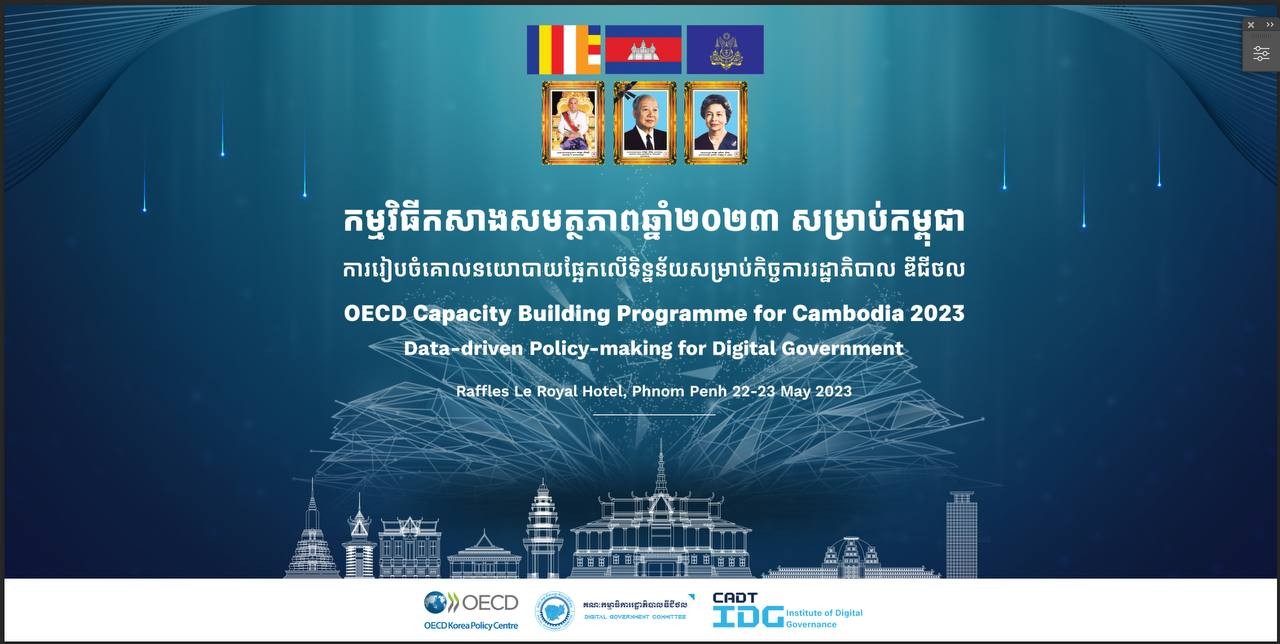-
Contents
On May 22~23, the Public Governance Programme of the OECD Korea Policy Center, in collaboration with the OECD Public Governance DIrectorate, Cambodia's DIgital Government Committee and the Cambodian Digital Academy of Technology, hosted a Capacity Building Programme under the theme of "Advancing a data-driven government in Cambodia" -
Index
Advancing a data-driven government in Cambodia
Background
Towards a data-driven government in Cambodia: Delivering better services, decisions and policies for the people
The Royal Government of Cambodia adopted Cambodia Digital Government Policy 2022-2035 in January 2022. The policy’s vision aims at "establishing a digital government to improve the citizens’ quality of life and build their trust through better public service provision". For this purpose, it outlines four strategic goals, ten strategies, 83 Priority Actions, and the institutional arrangements needed to advance the digital transformation of Cambodia’s government and public sector.
Among the 83 Priority Actions, variedly spread out over the 14-year period, some actions are explicitly focused on advancing towards greater digital government development, including building a data-centric government.
Data is a ubiquitous element and permeates the entire policy. First, diverse categories of data are initially needed for sound policymaking towards digitalization. Second, policies regarding the government's handling of data are crucial for successful digitalization. Third, and seemingly in a circular manner, data-driven policymaking is one of the expected benefits of digitalization itself. In this light, Priority Actions listed in Cambodia’s Digital Government Policy include the formulation of a data governance policy and an open data policy, and the development of data standards and a National Infrastructure Database System.
The Public Governance Programme of the OECD Korea Policy Centre
Since its launch in 2005, the Public Governance Programme of the OECD Korea Policy Centre (KPC) has been providing capacity-building assistance to countries in the Asia-Pacific region through its Capacity Building Programme (CBP). Since 2019, the CBP has benefited from the close collaboration between the KPC and the OECD Digital Government and Data Unit, Public Governance Directorate (GOV) as an effort to advance the digital transformation of public sectors in different regions, including South-East Asia, in line with OECD best practices, standards, and principles.
These activities contribute to the close collaboration between the OECD and countries in South-East Asia in the context of the OECD South-East Asia Regional Programme, and the Memorandum of Understanding between the OECD and the Association of Southeast Asian Nations (ASEAN).
The OECD work on digital government and data
At the OECD, the work on digital government and data has been a key policy area for the Public Governance Directorate for over a decade, with the OECD Recommendation of the Council on Digital Government Strategies (2014) and Enhancing Access to and Sharing of Data (2021) as guiding normative policy instruments. To foster peer-to-peer learning with more non-member countries, the OECD Working Party of Senior Digital Government Officials (E-Leaders) established the Global E-Leaders Initiative to exchange insights on digital government practices beyond OECD "borders". The OECD has also created the Network on Open and Innovative Government in Southeast Asia as an international forum to discuss cross-cutting opportunities, challenges and priorities in open government, digital government, and public sector innovation.
Objective
On May 22~23rd, the OECD Korea Policy hosted a Capacity Building Programme (CBP) in Cambodia in collaboration with the OECD Digital Government and Data Unit.
The 2023 edition of the CBP was implemented in partnership with the Cambodia Academy of Digital Government and the Digital Government Committee and focused on the topic of Data-driven Policy Making for a Digital Government.
The OECD KPC’s Cambodia Capacity Building Programme 2023 drew on previous editions of the CBP, intending to build capacities on digital government and data in South-East Asia. It was organised under the framework of the OECD Global E-Leaders Initiative and connected to broader OECD work in the region. It was also aligned with the current development of public governance indicators in South-East Asia, including the regional editions of the OECD Digital Government Index and the OECD Open, Useful, and Re-usable data (OURdata) Index.
Scope
The OECD Recommendation of the Council on Digital Government Strategies (2014) defines digital government as "the use of digital technologies, as an integrated part of governments' modernisation strategies, to create public value. Since its adoption, the Recommendation has been used in numerous OECD Digital Government Studies and Reports[1] to support the assessment and formulate policy recommendations to support governments' transition from e-government to digital government.
Building on the Recommendations' principles and the OECD experience in analysing digital government approaches, the OECD Digital Government Policy Framework (DGPF) identifies critical determinants of digital government maturity through six dimensions: Digital by design, Data-driven public sector, Government as a platform, Open by default, User-driven, and Proactiveness.
Based on the OECD Digital Government Policy Framework and the OECD models for the data-driven public sector and data governance in the public sector, the CBP covered three main topics:
1. Policymaking for Digital Government
2. Data-Driven Policymaking
3. Advancing data governance at the technical level
-
 Open & Innovative Government
Open & Innovative GovernmentCapacity Building Programme Cambodia 2023
2023.05.22 |
Download ENGLISH
Our Work
